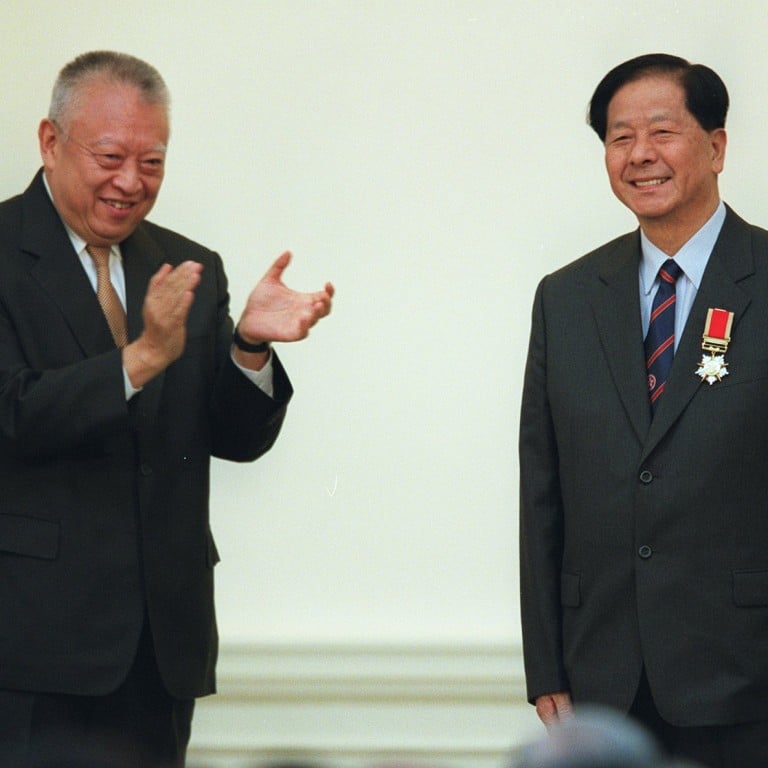
Tributes aside, leftists' instigating role in 1967 riots must not be whitewashed
Gary Cheung says the death of a ringleader of the riots exposes polarised views even today
Lyrics from the Simon and Garfunkel classic, - " - may well sum up the divided response to the death of Yeung Kwong, the ringleader of the 1967 riots and veteran leader of the Federation of Trade Unions.
Pro-Beijing newspapers heaped praise on Yeung's "contribution to the labour movement" and people posted tribute messages like "we will miss our fellow fighter in the anti-British and anti-persecution struggle", which FTU lawmaker Alice Mak Mei-kuen put up on her Facebook page.
Meanwhile, some internet users who are critical of the pro-Beijing camp posted messages like "Yeung Kwong, you are a murderer with blood on your hands" on Facebook groups set up by like-minded people.
The polarised views of Yeung, who was director of the All-Circles Anti-Persecution Struggle Committee during the 1967 disturbances, underscore the entrenched division between the leftist camp and mainstream society, long after the bombs and bloodied bodies have been cleared from the streets.
Forty-eight years on, the 1967 riots still polarise Hong Kong. While the leftist camp boasted of their "righteous revolt" against the oppression by the colonial government, most people outside the camp highlighted the killing of Commercial Radio broadcaster Lam Bun in August 1967 after he criticised the rioters on his programme.
In their condolences, neither acting chief executive Carrie Lam Cheng Yuet-ngor nor the FTU, which Yeung led from 1962 to 1988, mentioned his role in the leftist-inspired riots. Lam praised Yeung for his contributions to the labour movement, reminiscent of the justification for awarding him the Grand Bauhinia Medal, Hong Kong's highest honour, in 2001.
The 1967 riots were seen as a spillover from the Cultural Revolution, which Mao Zedong launched on the mainland a year earlier. While Yeung led the struggle committee, the unrest was actually masterminded by the Hong Kong branch of Xinhua News Agency - which served as Beijing's de facto embassy in Hong Kong at the time. Yeung was chosen as the figurehead of the struggle committee largely because of Beijing's preference for a leftist union leader to highlight "the leadership of the working class".
Having said that, Yeung should shoulder some responsibility for the extremist actions mounted under the name of the struggle committee. In a statement issued in July 1967, the committee threw its weight behind the bombing campaign, saying that the "anti-atrocities heroes" had adopted a "people's warfare" which had "exhausted" the colonial government.
After the anti-British disturbances were quelled, most leftist leaders remained silent and even unrepentant about the excessive actions taken by some militants in 1967. To date, Wong Kwok-kin is the only FTU leader to have said sorry for the atrocities suffered by innocent people during the riots.
As someone who has spent nearly two decades studying the 1967 riots, I think it is time to set the record straight on the fallacies put forward by the leftists about the disturbances. They have been arguing that they were moved to act by Hong Kong people's social discontent, pointing to the lack of labour rights protection and the plight of the underprivileged.
It is true that such social ills existed in the 1960s. Yet, when a 5-cent fare rise for the ferry ride between Central and Tsim Sha Tsui triggered the Star Ferry riots in 1966, the leftist camp had at first stood idly by. Editorials in pro-Beijing newspapers even threw their weight behind the colonial government's suppression of the disturbances.
The following year, however, after the Cultural Revolution had started, the leftists used the labour dispute to launch an anti-British struggle.
Since the mid-1990s, the leftist camp has also claimed that the riots sparked the sweeping social reforms of the 1970s. This is to downplay the social background to the riots.
It is worth noting that there was already momentum within the colonial government in the mid-1960s to initiate social reform. In early 1967, an interdepartmental report put forward an ambitious reform programme, including a mandatory provident fund and social insurance to protect the labour force. But the proposals were shelved because of opposition from the business community.
One of the unintended consequences of the riots was renewed momentum for social reforms to improve working conditions, which helped overcome opposition from business. It is fair to say that the riots served as the catalyst for reform, but were not the cause.
The riots claimed 51 lives, 15 in bomb attacks. But it is oversimplifying matters, and unfair, to assume that these bomb attacks represented the whole picture. Among the 1,936 people convicted during the disturbances, only 118 were found guilty of bombing-related offences.

